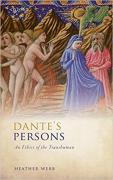Dante's Persons

This volume explores the concept of personhood in Dante’s Commedia and seeks out the constituent ethical modes that the poem presents as necessary for attaining a fullness of persona. This study suggests that Dante presents a vision of ‘transhuman’ potentiality in which the human person is, after death, fully integrated into copresence with other individuals in a network of relations based on mutual recognition and interpersonal attention. The Commedia, the author argues, aims to depict and to actively construct a transmortal community in which the plenitude of each individual’s person is realized in and through recognition of the personhood of other individuals who constitute that community, whether living or dead. Webb focuses on the strategies the Commedia employs to call us to collaborate in the mutual construction of persons. As we engage with the dead that inhabit its pages, we continue to maintain the personhood of those dead. Webb investigates Dante’s implicit and explicit appeals to his readers to act in relation to the characters in his otherworlds as if they were persons. Moving through the various encounters of Purgatorio and Paradiso, this study documents the ways in which characters are presented as persone in development or in a state of plenitude through attention to the ‘corporeal’ modes of smiles, gazes, gestures, and postures. Dante’s journey provides a model for the formation and maintenance of a network of personal attachments, attachments that, as constitutive of persona, are not superseded even in the presence of the direct vision of God.